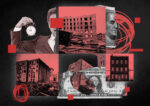As the sharks circling rent-stabilized owners close in, City Skyline Realty is the latest to get bit.
Loan servicers filed foreclosure suits Friday against four buildings owned by the firm, which defaulted on $26 million in debt, court records show.
The Upper Manhattan properties — 174 West 137th Street, 507 West 139th, 510 West 148th Street and 505 West 161 Street — are all rent-stabilized, according to housing data shared with The Real Deal.
City Skyline, headed by Douglas Peterson, could not be reached for comment.
The defaults might signal a greater wave of distress heading for owners of rent-stabilized buildings struggling against the financial straits of New York’s 2019 rent law.
The legislation capped revenues and the recoupable cost of renovations. That was followed by a Covid exodus and eviction moratorium; soaring operating expenses, including insurance, utilities and maintenance; and a jump in mortgage rates.
In four years under the state’s Housing Stability and Tenant Protection Act, the value of rent-stabilized buildings has plummeted anywhere from 20 to 45 percent, said Shimon Shkury, founder of brokerage Ariel Property Advisors, which specializes in rent-stabilized deals.
Industry observers say most owners are struggling to get by.
Just two years after the rent reform passed, owners saw net operating income slide 9 percent annually while the market share of distressed properties jumped to 9 percent, the highest level since 2009, according to a recent report by the Rent Guidelines Board.
But owners who refinanced right before the rent law changed, taking out loans underwritten on pre-2019 property values, have been the most exposed to the effects of declining net cash flow.
City Skyline obtained the debt on its four distressed properties in 2018.
The firm faced an earlier foreclosure in June after it defaulted on the $10 million loan tied to the rent-stabilized 2710 Morris Avenue in the Bronx.
But those defaults may be only the beginning for City Skyline. The firm has at least an additional $50 million in delinquent property debt, according to a July report from Freddie Mac. Records from late-2021 to mid-2022 show cash flow at the properties was barely covering debt service.
Read more



